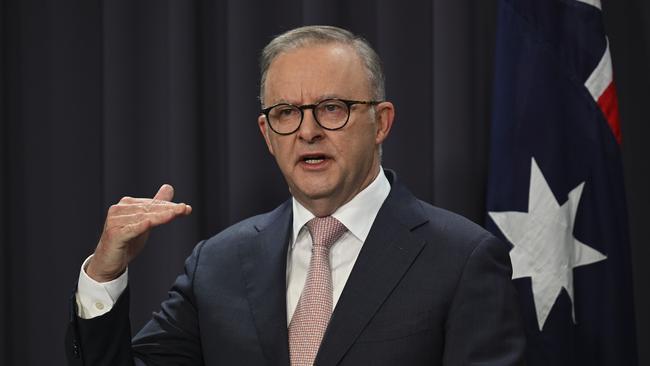Anthony Albanese rejects critics of Made in Australia agenda as flat earthers
Anthony Albanese has dismissed critics of his Made in Australia policy as “flat earthers” after former Productivity Commission chair likened the agenda to a “fool’s errand”

Anthony Albanese has dismissed critics of his Made in Australia agenda as flat earthers after inaugural Productivity Commission chair Gary Banks likened the policy to a “fool’s errand” and the IMF warned advanced economies risked making damaging “policy mistakes.”
In its latest fiscal monitor released on Wednesday night, the IMF said history showed “getting industrial policy right is a tall order” and could lead to an “inefficient allocation of resources”.
“Indeed, an abundance of failed programs in countries with strong institutions shows that it is difficult to avoid policy mistakes,” it said.
“Support may not be allocated to the right sectors, lowering the benefits of industrial policies.
“For example, subsidies may be diverted to politically connected sectors instead of being solely driven by social returns.”
The benefits of directing fiscal support to drive innovation in specific sectors was more limited in nations like Australia where only about 10 per cent of patents were domestically generated as compared to the US where the figure was about 70 per cent.
Economist Saul Eslake told The Australian the IMF, while “not being completely opposed to these kinds of industrial policies”, had made clear they could only be beneficial “under certain conditions – most of which would not appear to hold in the Australian context”.
“In Australia, unlike Japan, Germany, the US or Korea, manufacturing is a below average productivity sector, so using policy instruments, subsidies and tax breaks to induce labour and capital to move into manufacturing from other sectors will, all else being equal, result in overall lower labour productivity and thus lower living standards in the long term,” he said.
The Prime Minister on Thursday hit back at Professor Banks for criticising the government’s flagship Made in Australia agenda and warning it would encourage companies to seek government sponsorship rather than lifting their performance.
“The world’s round, not flat,” Mr Albanese told 5AA radio. “That’s why (Professor Banks) is wrong. And we’re in a race for competition here as the economy shifts and changes. And if you just sit back and say, ‘Oh, well, we’ll just allow the market to operate without any engagement’, then we’ll fall behind.
“What we’re about here, to be very clear, is there’s a role for government, not in replacing the private sector. This isn’t the old protectionism. This is about how Australia supports industries which will be able to stand on their own two feet. What we’re talking about here as well is loans through our critical minerals facility. So, this isn’t corporate welfare, this is something that will be repaid,” he said.
Professor Banks on Wednesday challenged this argument, declaring that “while the PM and Treasurer have portrayed it as a new form of competition policy distinct from the ‘old protectionism’, the differences lie mainly in the instruments used and industries targeted. Import displacement is at the heart of both.”
The criticism was similar to that made by the government’s hand-picked Productivity Commission chair, Danielle Wood, who argued that subsidies for the low-emissions manufacturing sector would “take jobs and capital investments from elsewhere in the economy where they could generate higher value”.




To join the conversation, please log in. Don't have an account? Register
Join the conversation, you are commenting as Logout